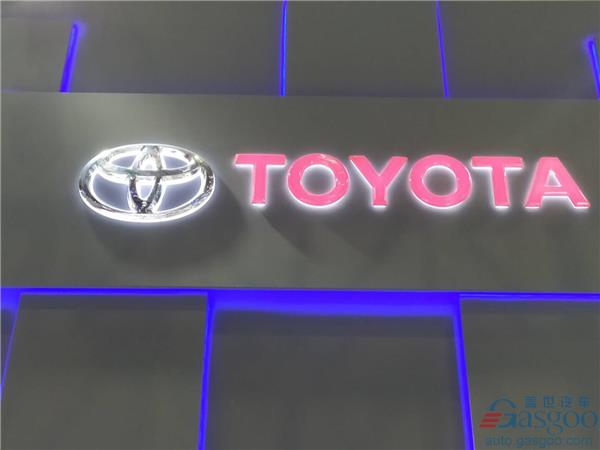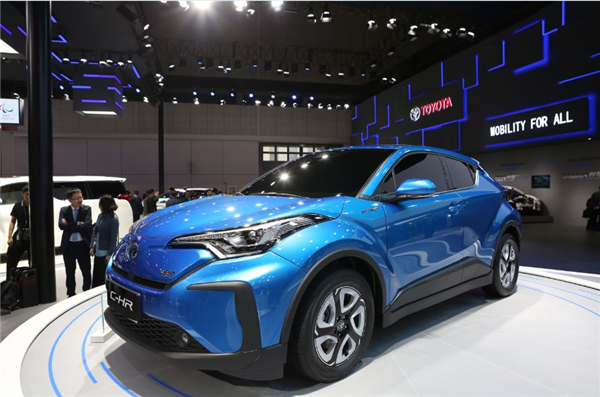Toyota presses ahead with electrification, mobility service in China
Shanghai (Gasgoo)- Much has been said about how four disruptive trends (electrification, intelligence, connectivity and sharing), are changing the automobile industry. In China, the world's largest auto market, automakers are fortifying their offensive to these areas, and none of them want to lag behind rivals.
In spite of the prolonged downturn in China's auto market, Toyota still achieved blooming year-on-year sales growth in the first eleven months. However, things are not written for all eternity. The old-line automaker obviously knows that the “four trends” are crucial to its long-term sustainable development in this country.

Toyota announced on September 26 it had cemented the cooperation with two Chinese state-owned automaker partners, FAW Group and GAC Group, to jointly research and develop electrified vehicles.
Apart from co-launching more hybrid and plug-in hybrid models, all parties would be dedicated to rolling out affordable high-quality all-electric and hydrogen fuel cell models to satisfy Chinese consumers' demands over power diversity.
Profitable but conservative, that's the key word offered when the industry speaks of Toyota. The company seems a bit late to the global EV game with no BEV model hitting the market yet. Nevertheless, in China, the Dual Credit Policy and the fasting-growing market demands necessitate the boost of electrification.
The Japanese automaker decides to carry out a four-prong strategy to simultaneously develop HEVs, BEVs, PHEVs and FCVs in China, according to its current deployment and the agreements inked with FAW Group and GAC Group. By virtue of the comprehensive partnership, Toyota is ambitious to start an all-around onslaught to China's NEV realm.
Besides, the step-up cooperation also involves the auto intelligence and connectivity fields, said Toyota, revealing the automaker’s all-about strategy set for the significant market.

(Photo source: Toyota China's WeChat account)

(Photo source: Toyota China's WeChat account)
In fact, Toyota has been paving the way for its foray into China's NEV market. At the Auto Shanghai 2019, the automaker offered the first glimpse of its C-HR- and IZOA-based BEVs, which were said to be locally-produced in China next year. The unveiling of the two significant models revealed Toyota was poised to make inroads to Chinese all-electric vehicle domain.
To more efficiently develop EVs that are in line with Chinese consumers' demands, Toyota opted to join hands with two local companies—BYD and CATL, instead of relying on standalone efforts. The former is the China's leading NEV manufacturer, while the latter takes up the most share in China's EV battery market. In middle July, the Japanese auto giant announced the collaboration with both of them.

(Photo source: CATL)
The partnership formed with CATL targets a stable supply and further development of NEV batteries. In addition, both parties had also commenced discussions about supply of batteries, new technology development, product quality improvements and the reuse and recycling of batteries.
The cooperation with BYD goes deeper. Two companies planned to co-develop sedan and low-floor SUVs as well as the onboard batteries for these vehicles and other for the purpose of launching them in the Chinese market under the Toyota brand in the first half of the 2020s.
To better advance the plan, Toyota and BYD agreed in November to establish a 50/50 joint venture, which would work on designed and developing BEVs (including platform) and relevant auto parts. The new company is anticipated to be launched in China in 2020.

(Photo source: DiDi)
With regard to the mobility service area, Toyota stepped up the collaboration with Chinese ride-hailing giant DiDi in July. As part of this agreement, the Japanese carmaker would invest $600 million in DiDi and a joint venture, which the two firms would establish with GAC Toyota to offer car-hailing drivers auto-related services.
Before that, Toyota and DiDi claimed cooperation on e-Palette in January 2018, and launched the vehicle leasing service for DiDi's ride-hailing drivers at a Toyota dealer in May 2018. Those cars are equipped with Toyota's in-vehicle device, TransLog, leveraging intelligent analysis capabilities of Toyota's proprietary Mobility Services Platform (MSPF) to provide quality automobile maintenance support and safe driving guidance to ride-hailing drivers.
The cemented collaboration would allow Toyota and DiDi to expand the various connected services provided by MSPF in its value chain including vehicle management, maintenance, insurance, and financing for customers and drivers to realize the high potential of the MaaS market in China. Toyota also aims to introduce and promote the widespread use of BEVs suitable for future mobility services in China.
It's worth noting that DiDi kicked off an international car-sharing alliance in April, 2018, and Toyota was among the 31 auto industry partners.
Gasgoo not only offers timely news and profound insight about China auto industry, but also help with business connection and expansion for suppliers and purchasers via multiple channels and methods. Buyer service:buyer-support@gasgoo.comSeller Service:seller-support@gasgoo.com







